Why you can trust Tom's Hardware
SanDisk Pro-G40 SSD 1TB
RATING: ★★★★ ½ (4.5 Stars)
PROS
+ Excellent all-around performance
+ Class-leading sustained write performance
+ Rugged, aesthetically-pleasing design
CONS
- Price
OUR VERDICT
The 1TB SanDisk Pro-G40 is the best portable SSD we’ve tested, getting strong marks in every performance category. It’s fast and rugged. If you can take advantage of the Thunderbolt capability and overlook the price, it’s hard to beat.
Comparison Products
We are testing the 1TB SanDisk Pro-G40 in both TB3 and USB modes. It’s up against the Samsung T7 Shield, the WD Black P50, the Samsung X5, the Kingston XS2000, the LaCie Rugged SSD Pro, and the SanDisk G-Drive Pro (previously G-Technology G-Drive).
Get Tom's Hardware's best news and in-depth reviews, straight to your inbox.
Trace Testing - 3DMark Storage Benchmark
3DMark’s Storage Benchmark focuses on real-world gaming performance. Each round in this benchmark stresses storage based on gaming activities including loading games, saving progress, installing game files, and recording gameplay video streams.
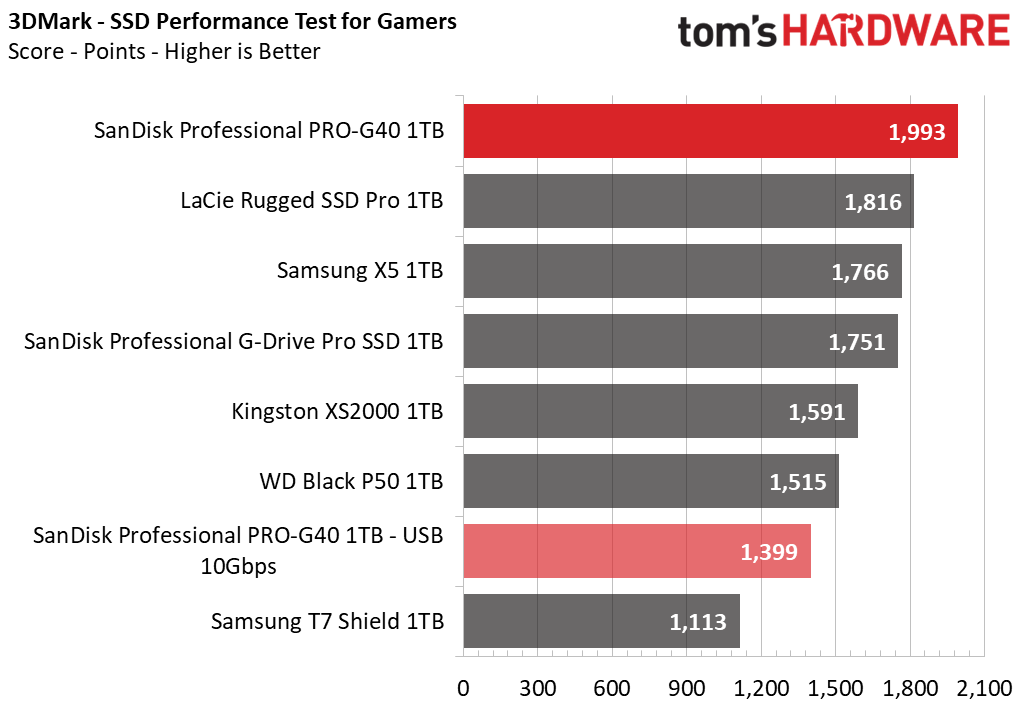
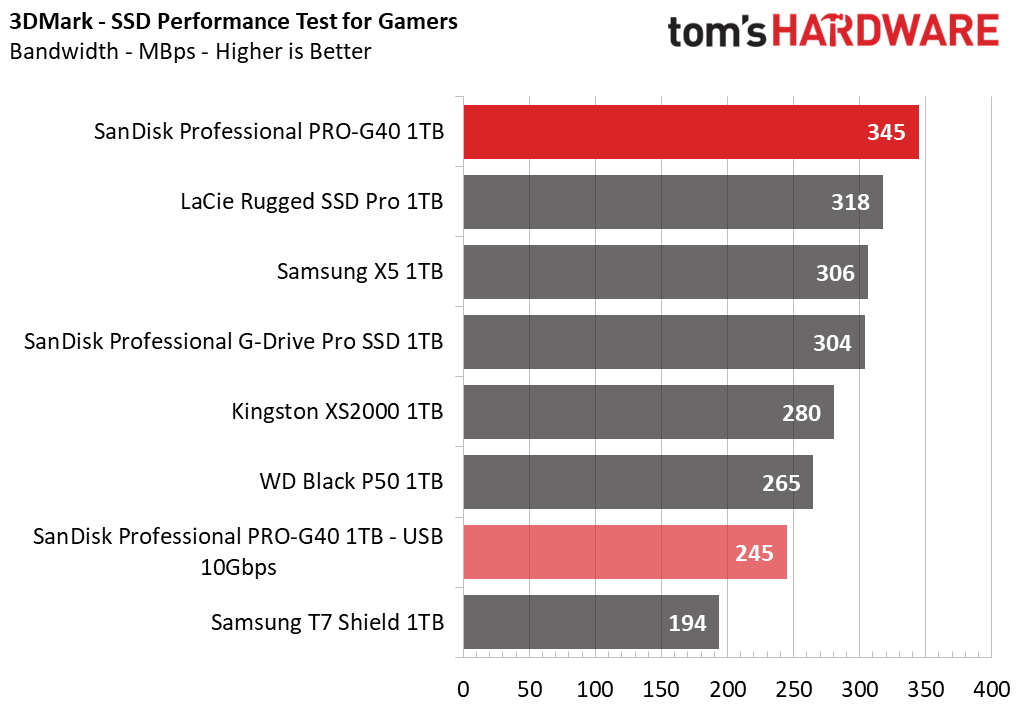
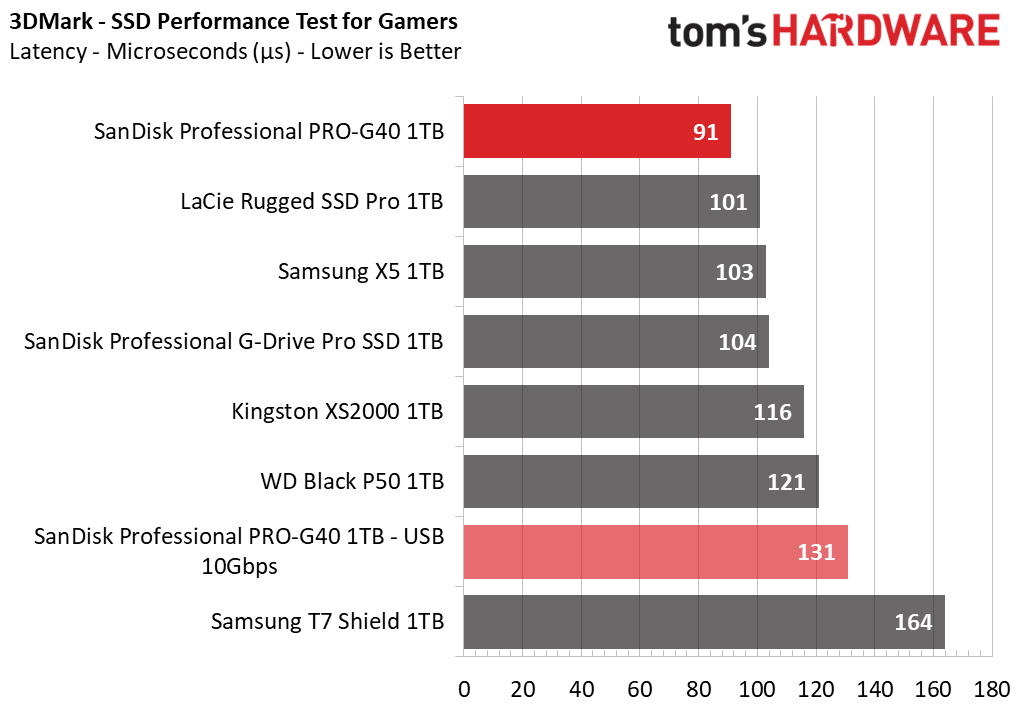
The Pro-G40 takes the crown in 3DMark when run in TB3 mode, but performance in USB mode is less impressive. Still, you should be buying this drive for its Thunderbolt functionality, with USB fallback being a bonus. In any case, this drive is serviceable for gaming.
Trace Testing – PCMark 10 Storage Benchmark
PCMark 10 is a trace-based benchmark that uses a wide-ranging set of real-world traces from popular applications and everyday tasks to measure the performance of storage devices.
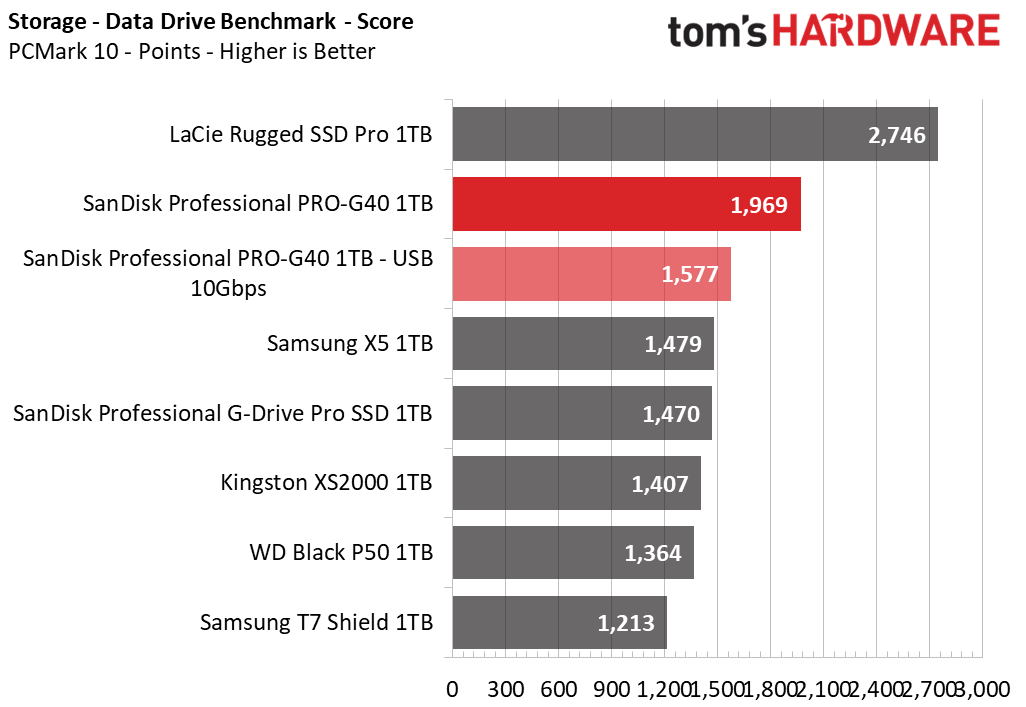
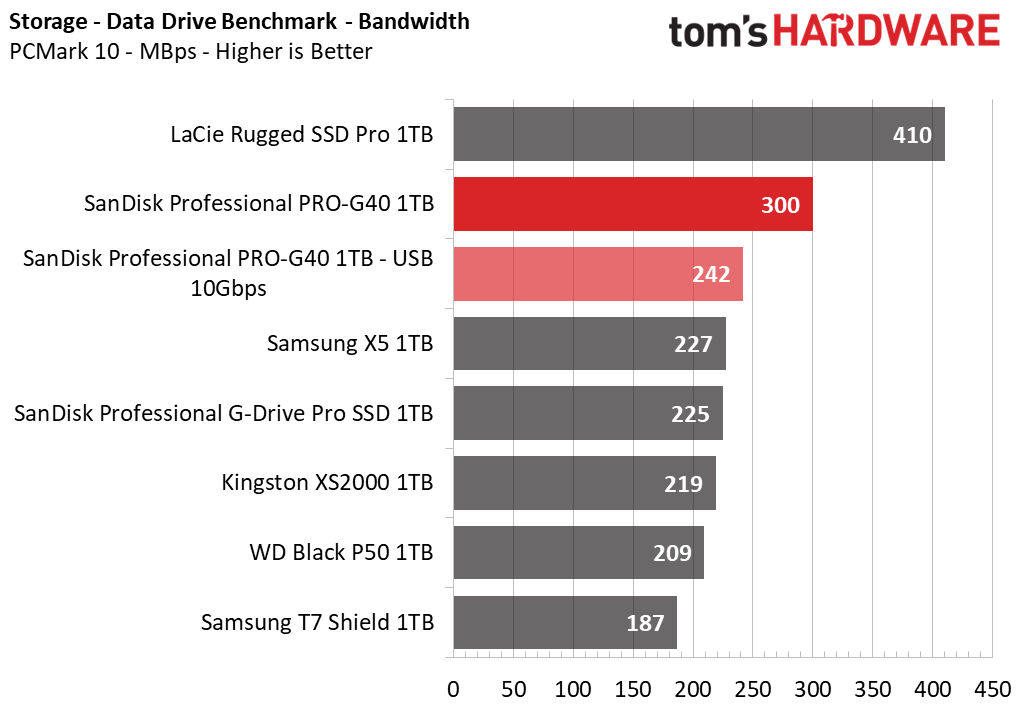
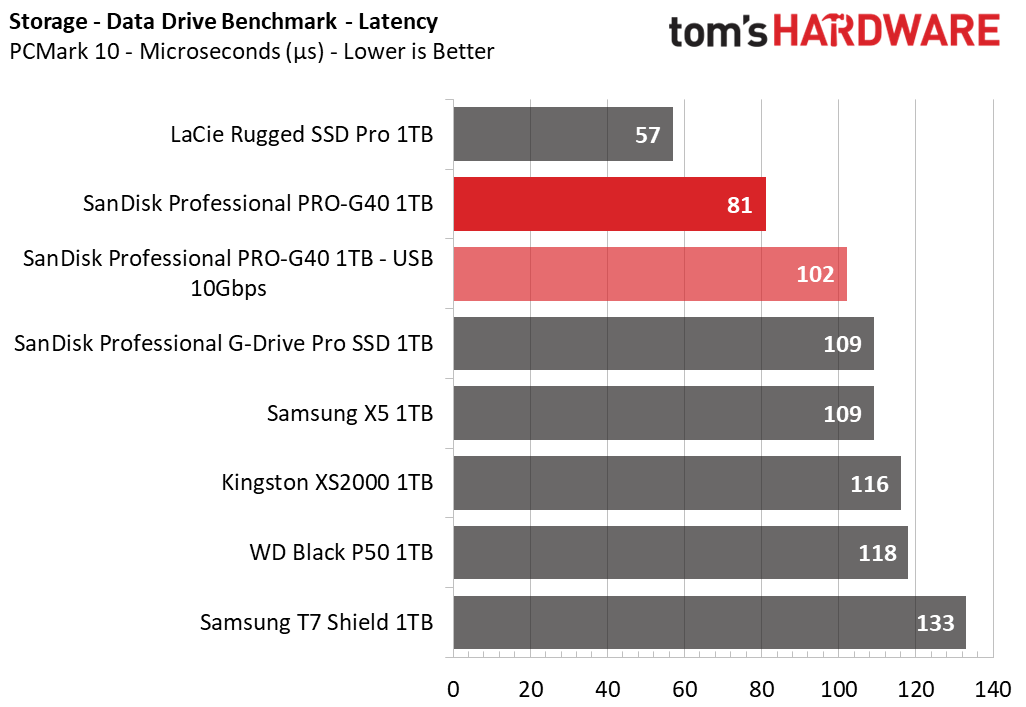
The Pro-G40 scores well in both modes in PCMark 10. It falls behind the LaCie which uses the same Thunderbolt controller and similar flash, but a different SSD controller. This might just be a quirk of the test. The Pro-G40’s latency is better in Thunderbolt mode, as expected, which is nice.
Transfer Rates – DiskBench
We use the DiskBench storage benchmarking tool to test file transfer performance with a custom, 50GB dataset. We copy 31,227 files of various types, such as pictures, PDFs, and videos to a new folder and then follow-up with a reading test of a newly-written 6.5GB zip file.
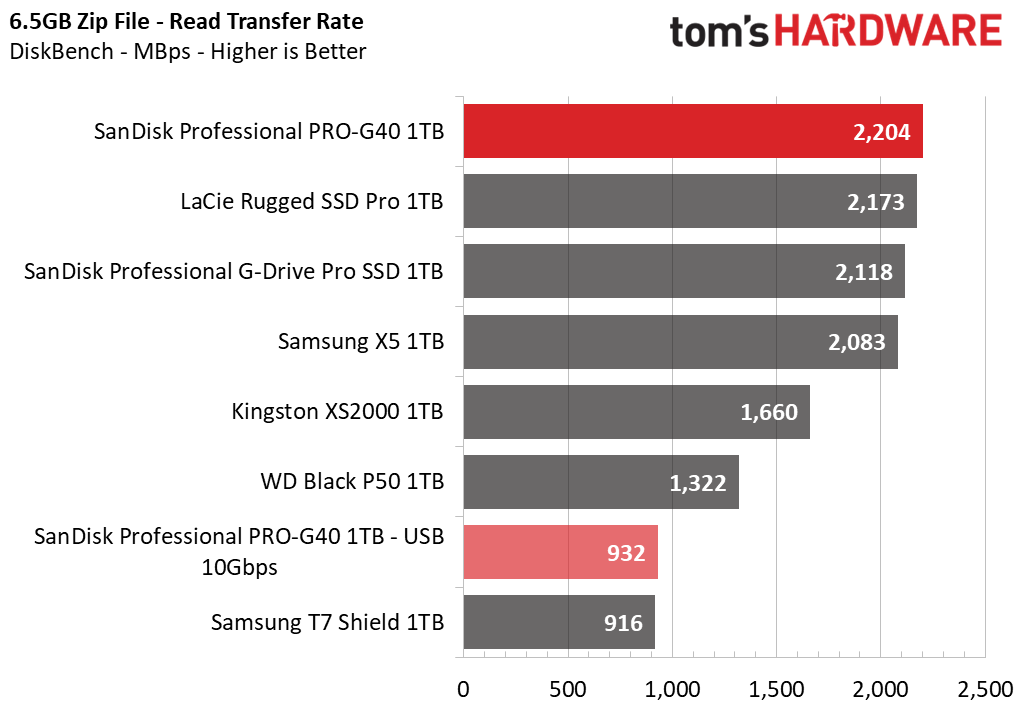
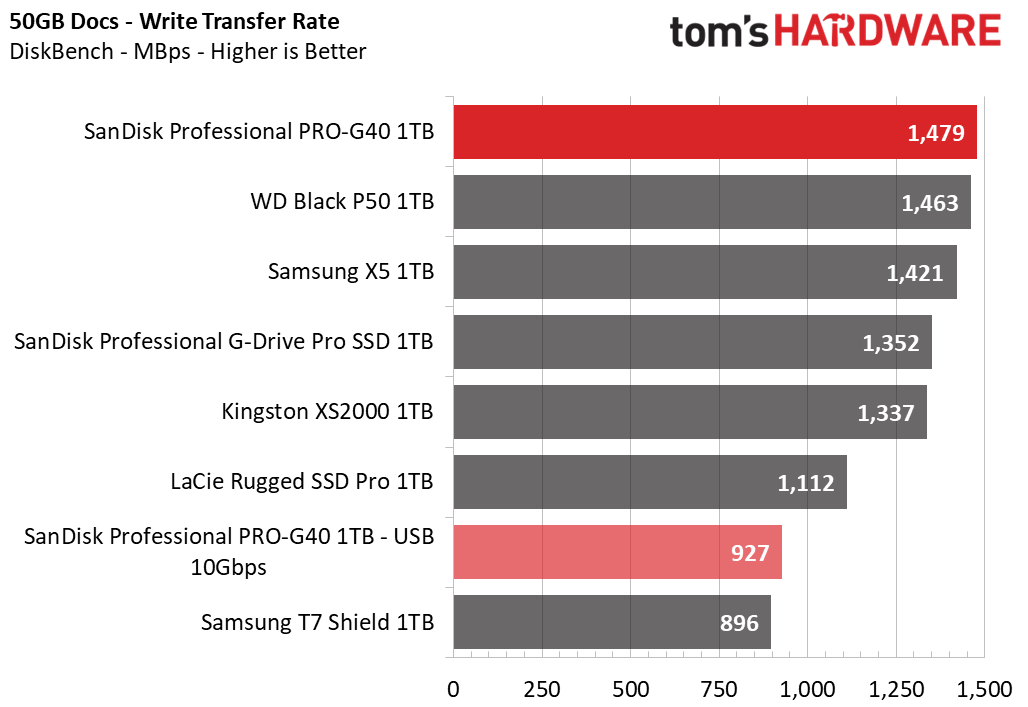
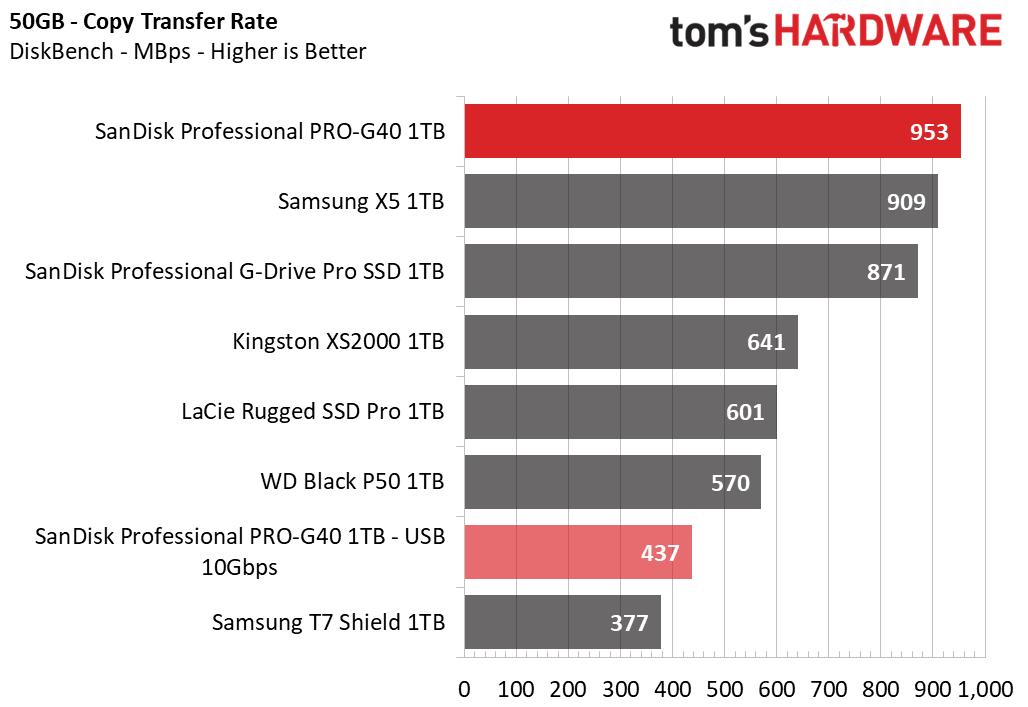
DiskBench is bandwidth-limited so we expect the Thunderbolt-capable drives to perform better, and they do. The Pro-G40 pushes the limits of what is possible with this interface. It’s not as performant in USB mode, but it manages to beat the Samsung T7 Shield, which is a cheaper competitor for that mode.
Synthetic Testing - ATTO / CrystalDiskMark
ATTO and CrystalDiskMark (CDM) are free and easy-to-use storage benchmarking tools that SSD vendors commonly use to assign performance specifications to their products. Both of these tools give us insight into how each device handles different file sizes.
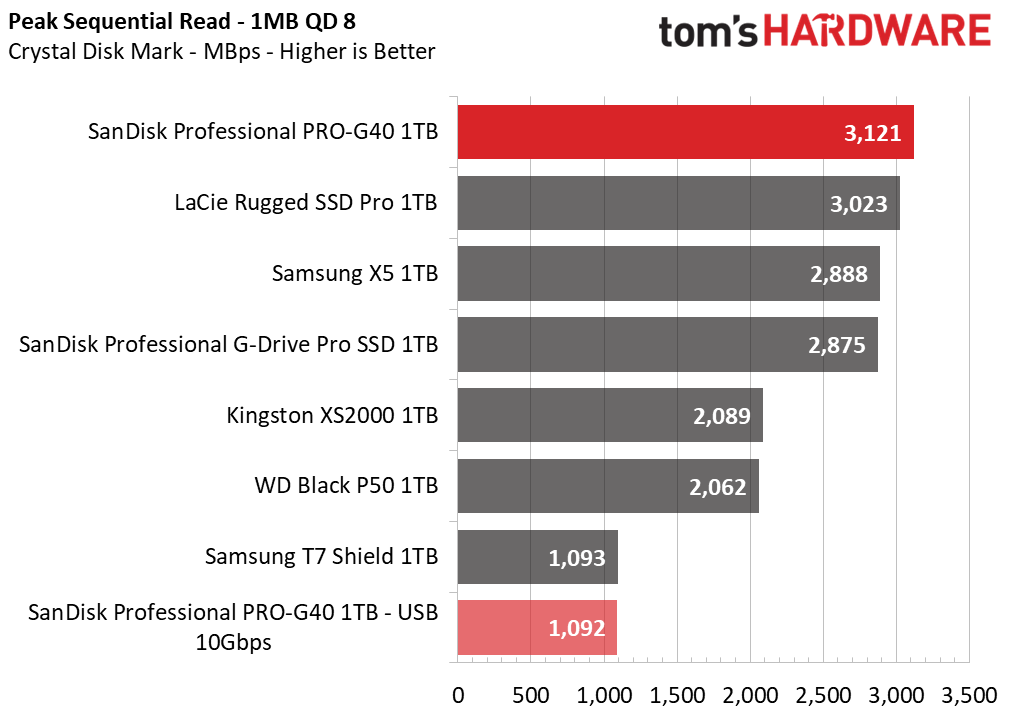
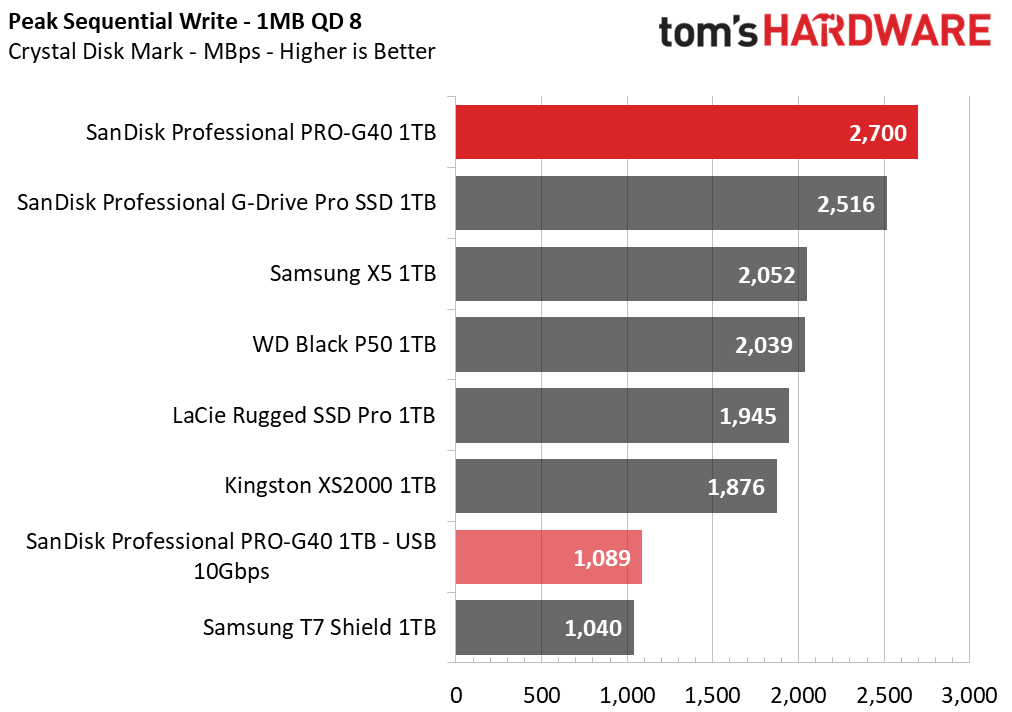
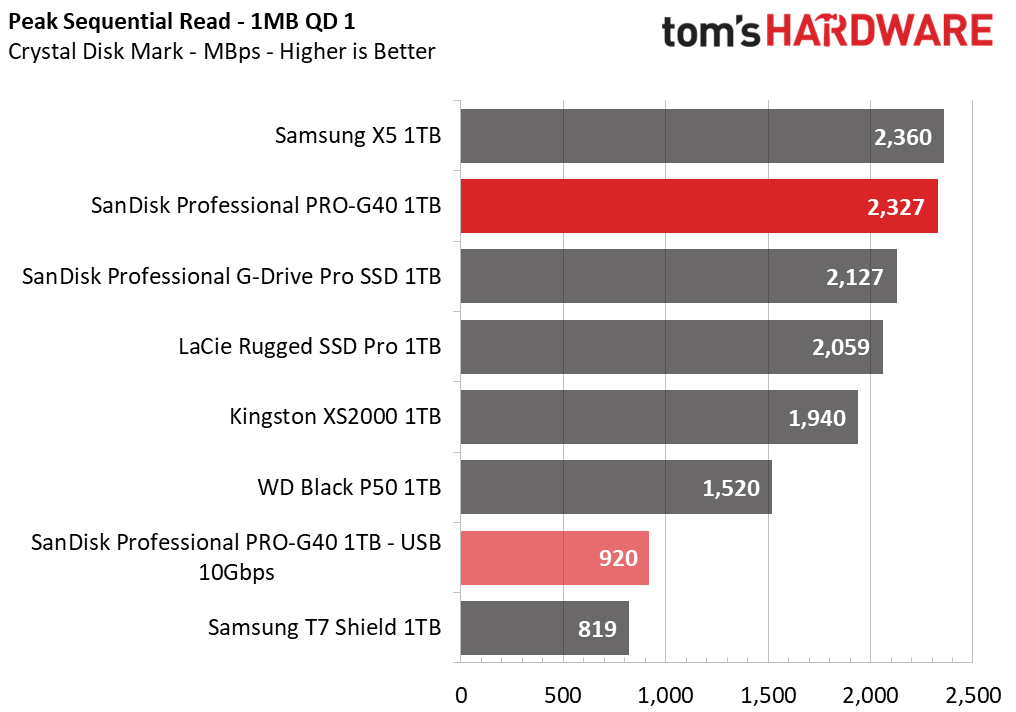
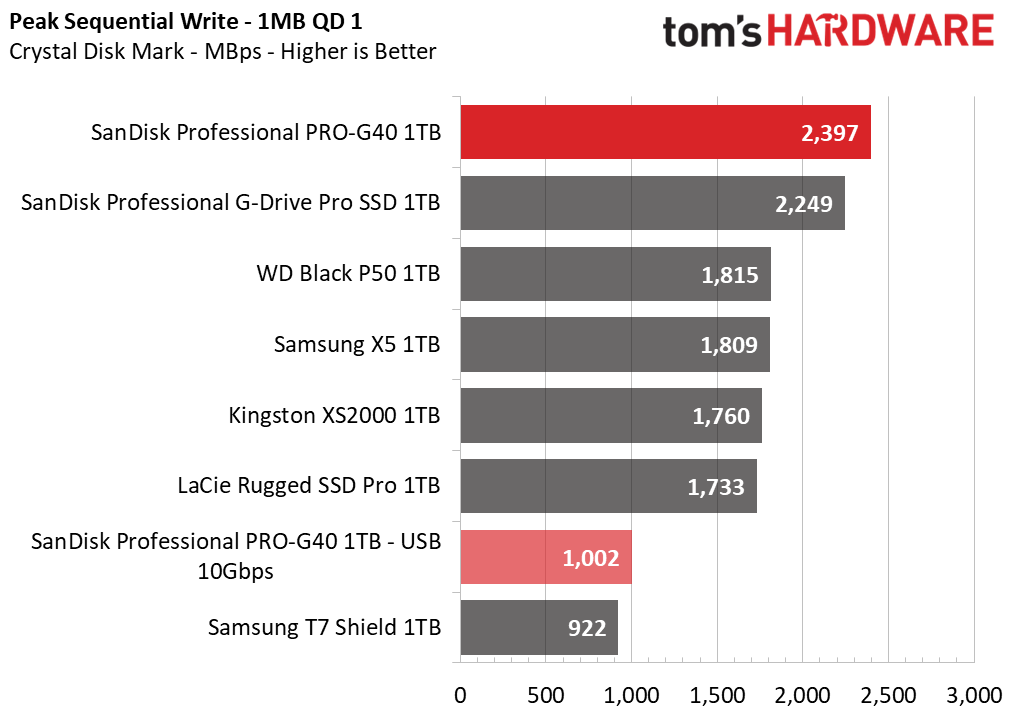
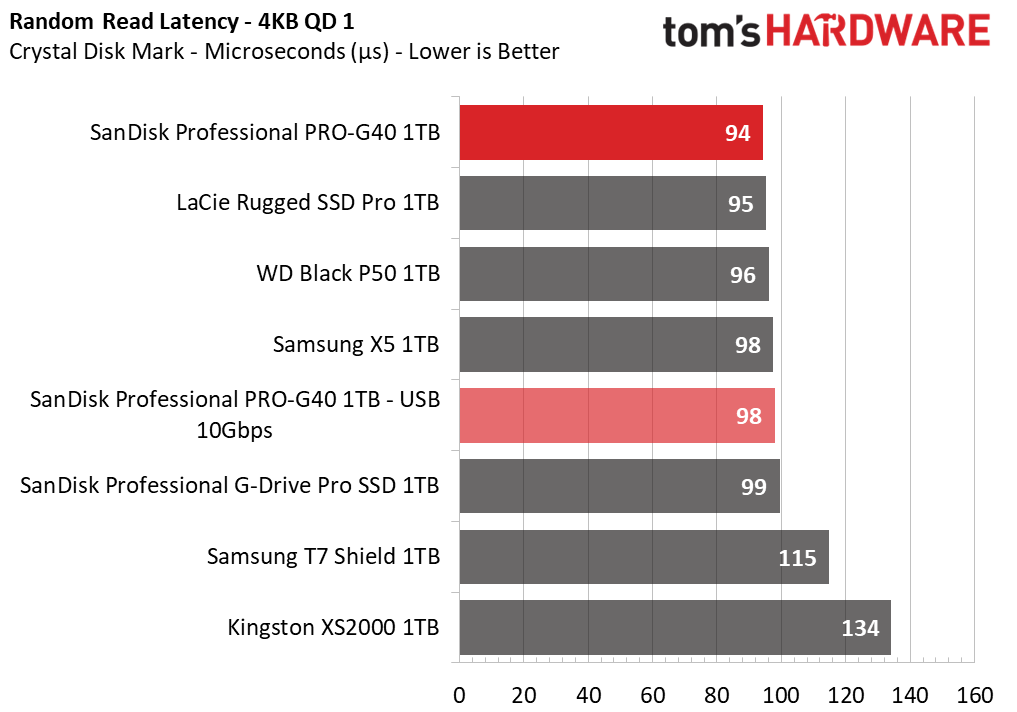
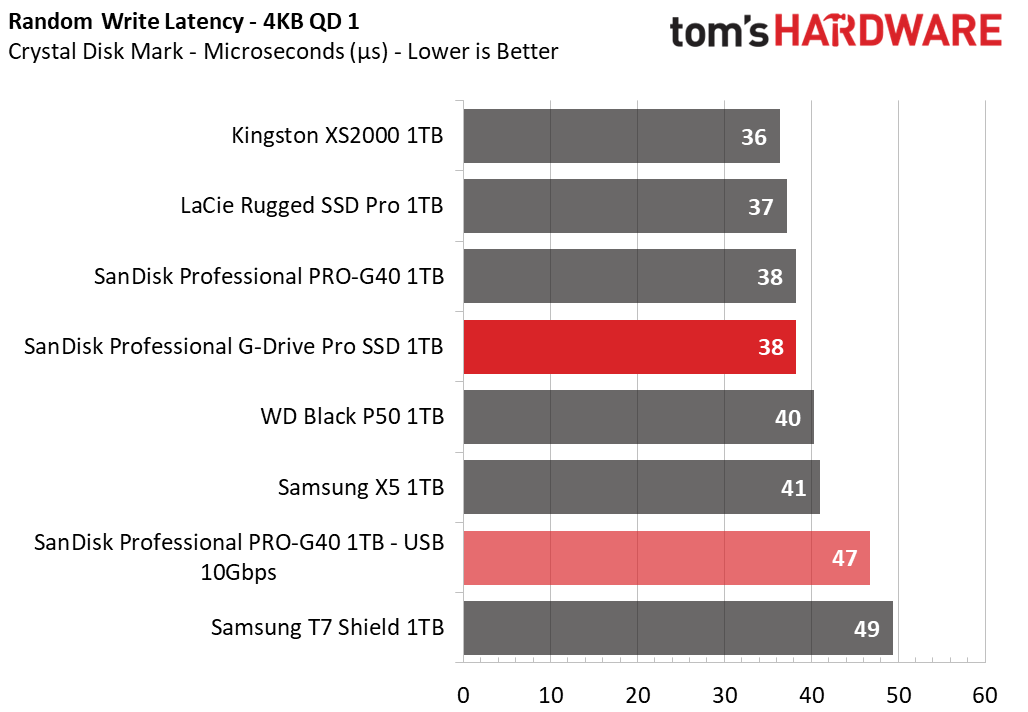
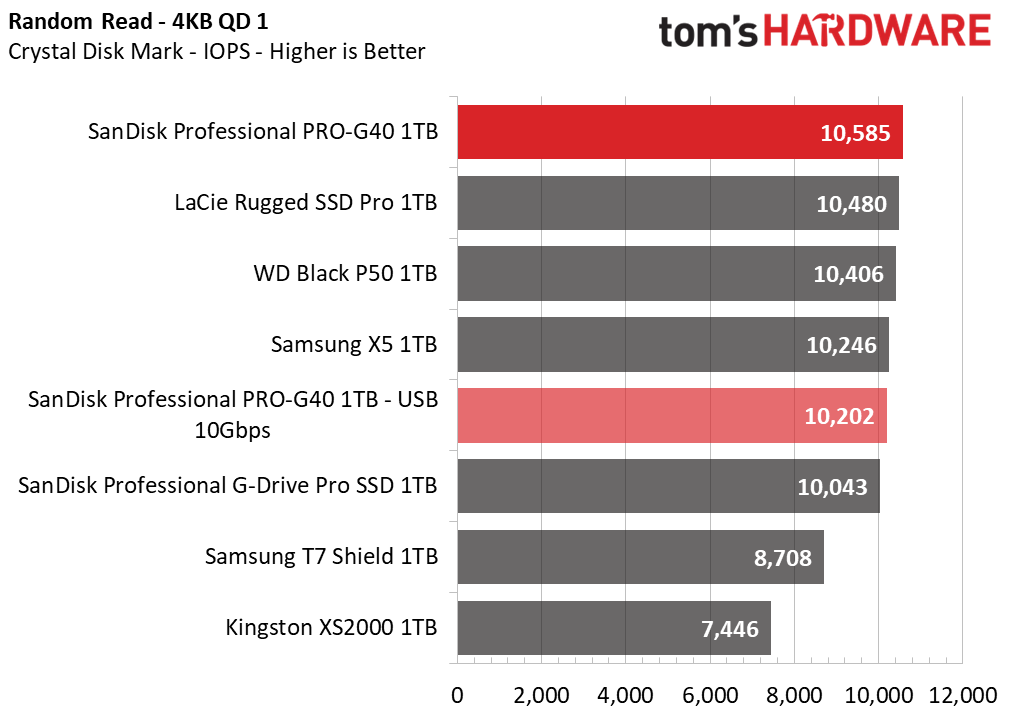
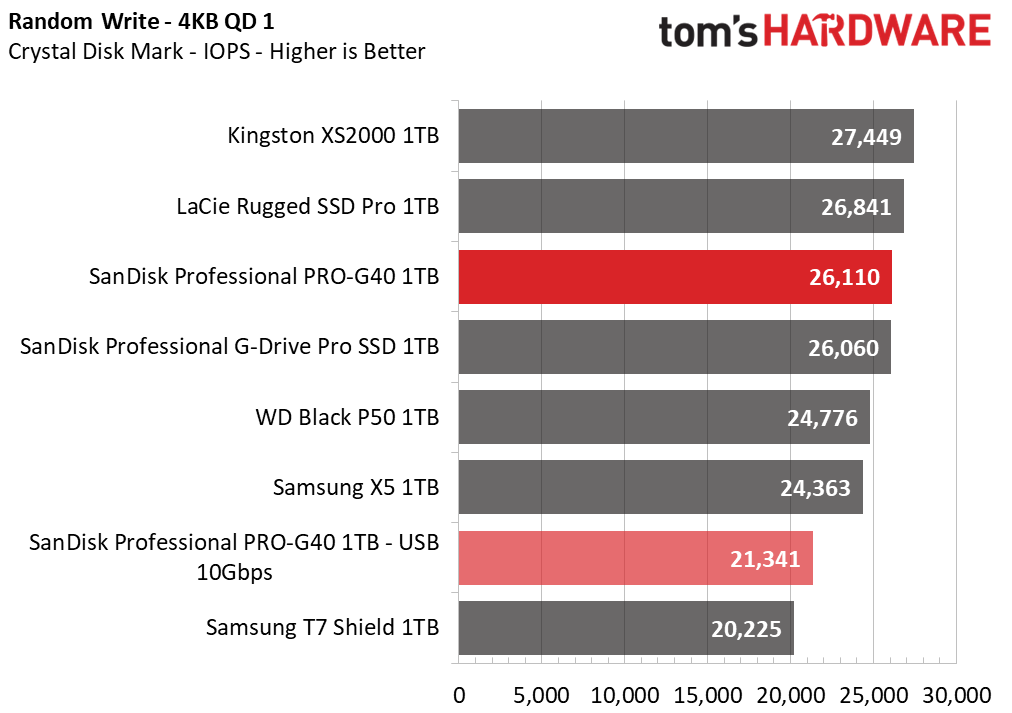
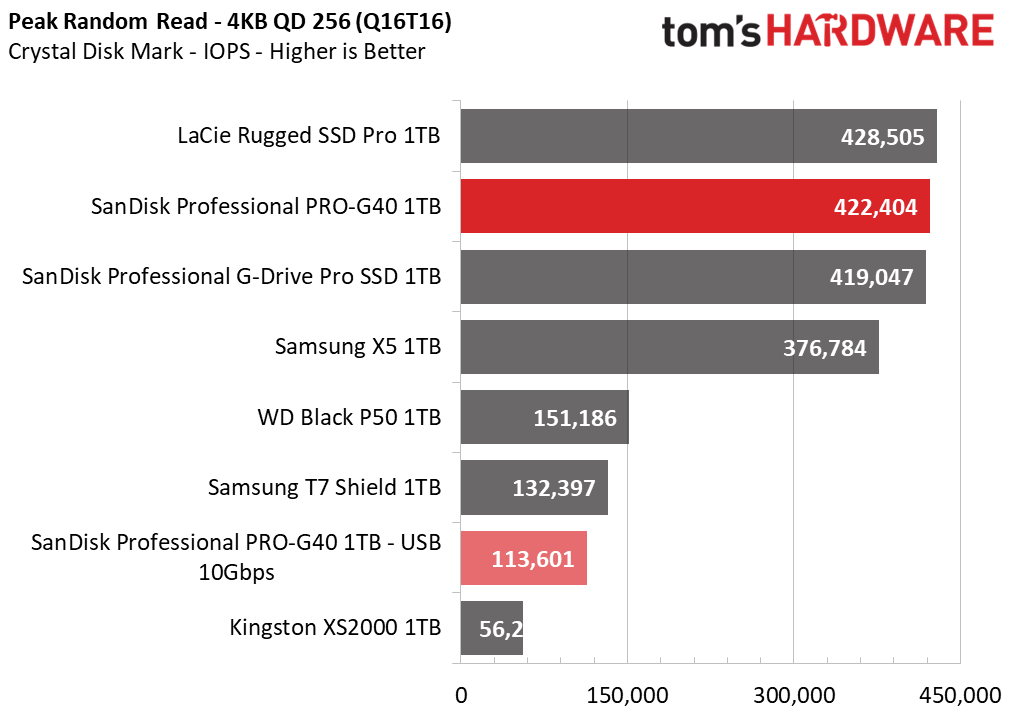
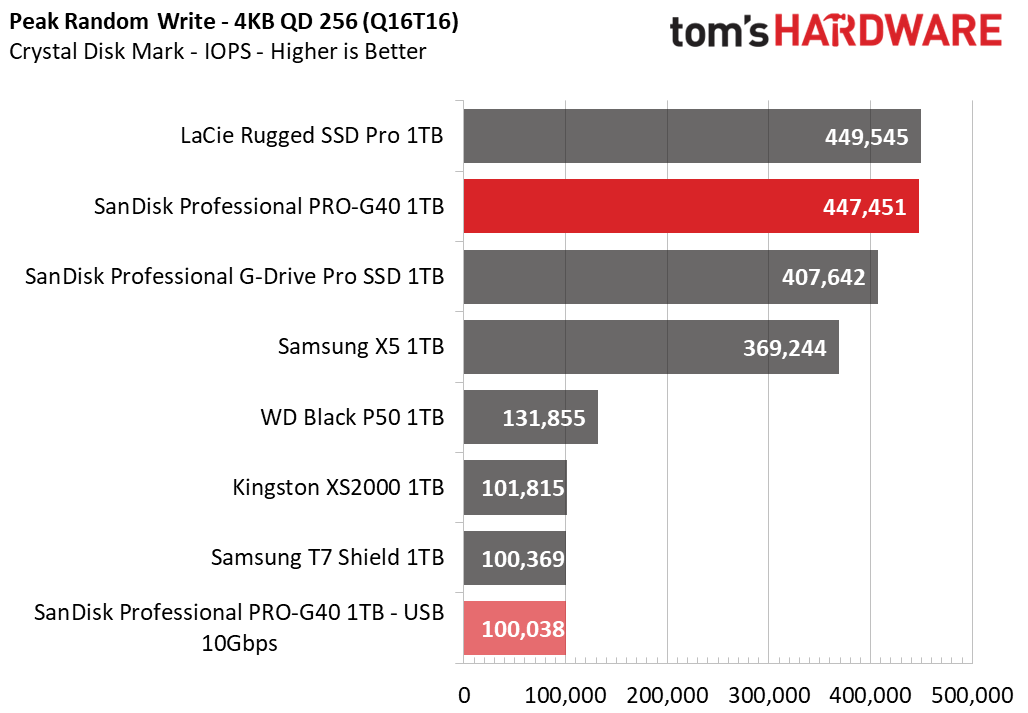
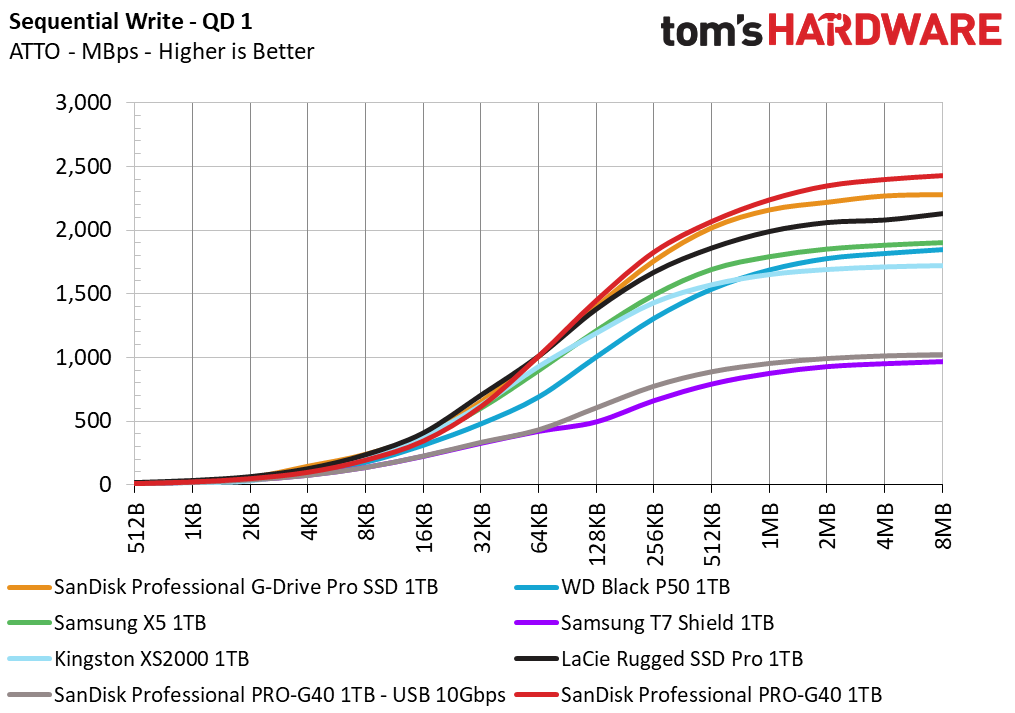
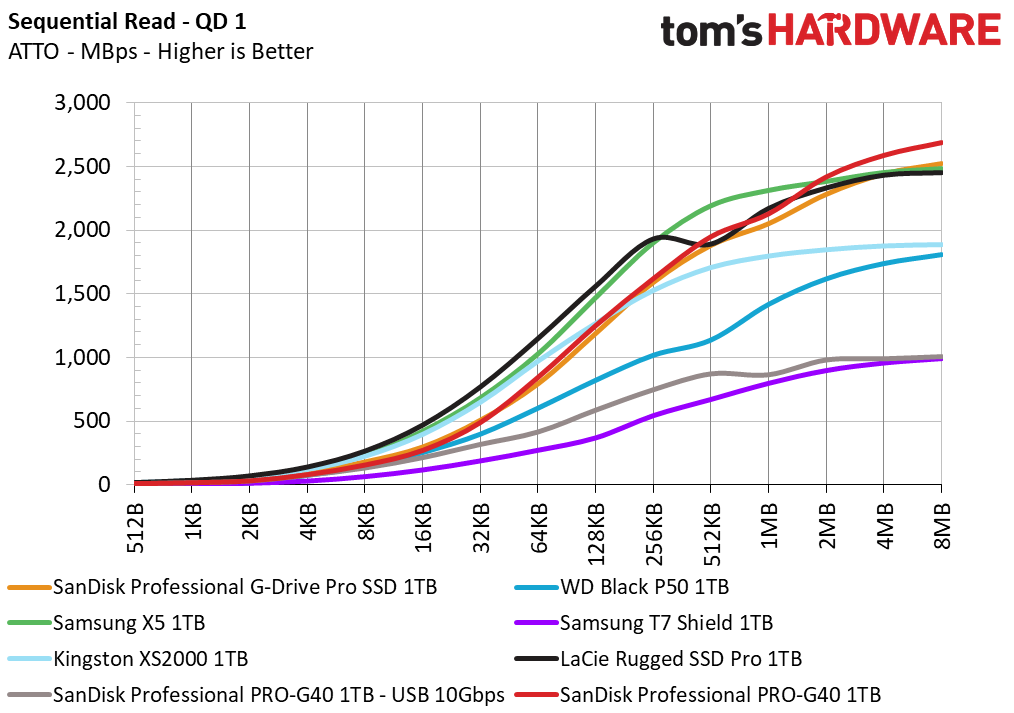
The Pro-G40 has exceptional sequential performance in Thunderbolt mode, seen both in the ATTO and sequential CDM results. In USB mode it matches or beats the T7 Shield. The 4K low queue depth and latency performance happen to be limited by the interface for respective drives, but the Pro-G40 is still among the best.
Sustained Write Performance, Cache Recovery, & Temperature
Official write specifications are only part of the performance picture. Most SSDs implement a write cache, which is a fast area of (usually) pseudo-SLC programmed flash that absorbs incoming data. Sustained write speeds can suffer tremendously once the workload spills outside of the cache and into the "native" TLC or QLC flash. We use Iometer to hammer the SSD with sequential writes for 15 minutes to measure both the size of the write cache and performance after the cache is saturated. We also monitor cache recovery via multiple idle rounds.
Temperatures are gauged at both idle and load states via sensor and an infrared thermometer. The typical ambient temperature is at 24C. The load state involves sustained writes at maximum speed with measurement ensuing if and until throttling is demonstrated to discover the equilibrium temperature.
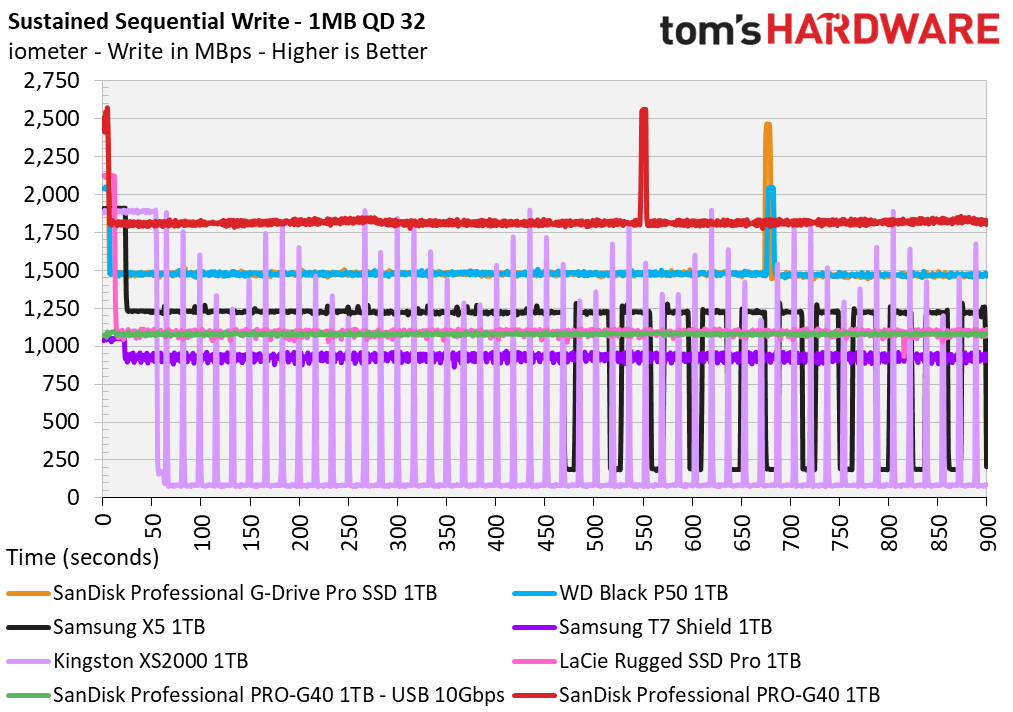
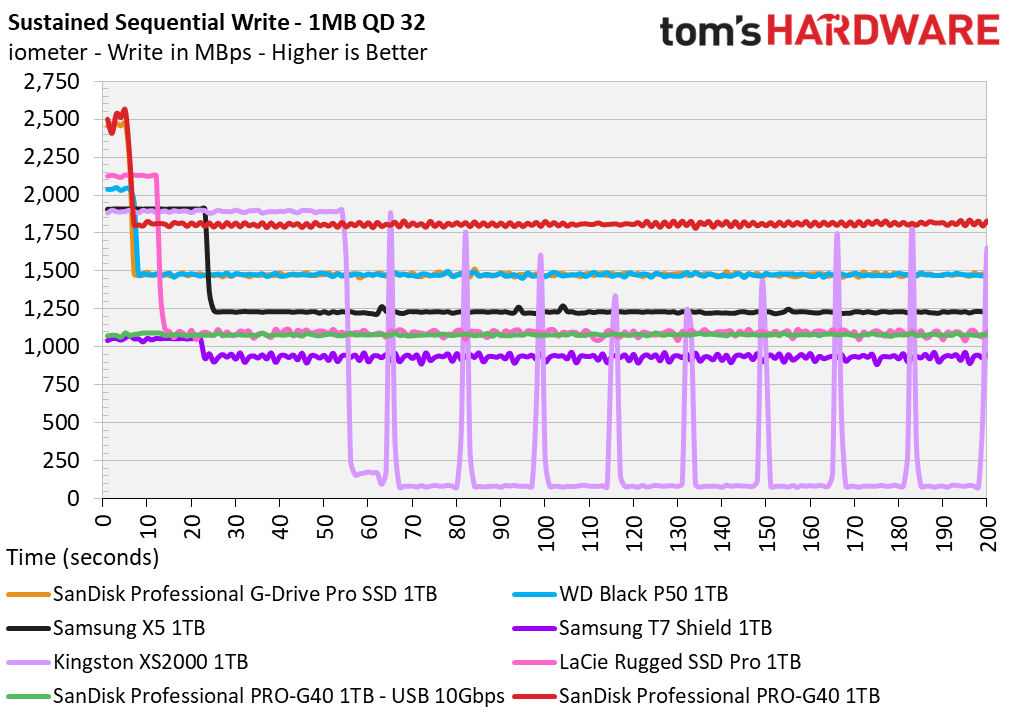
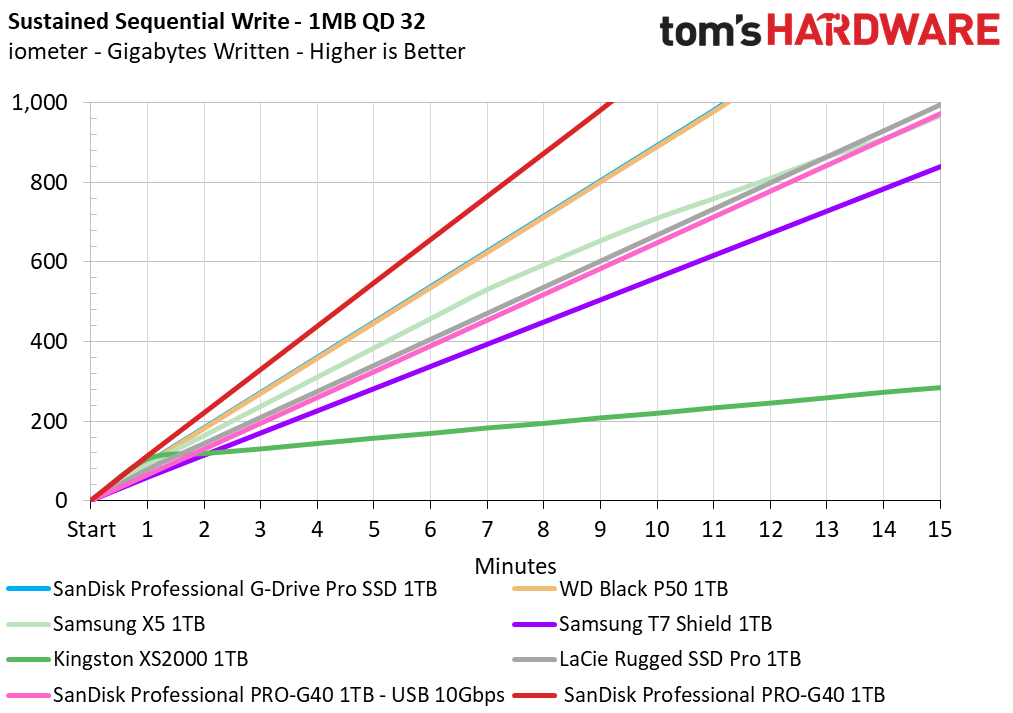
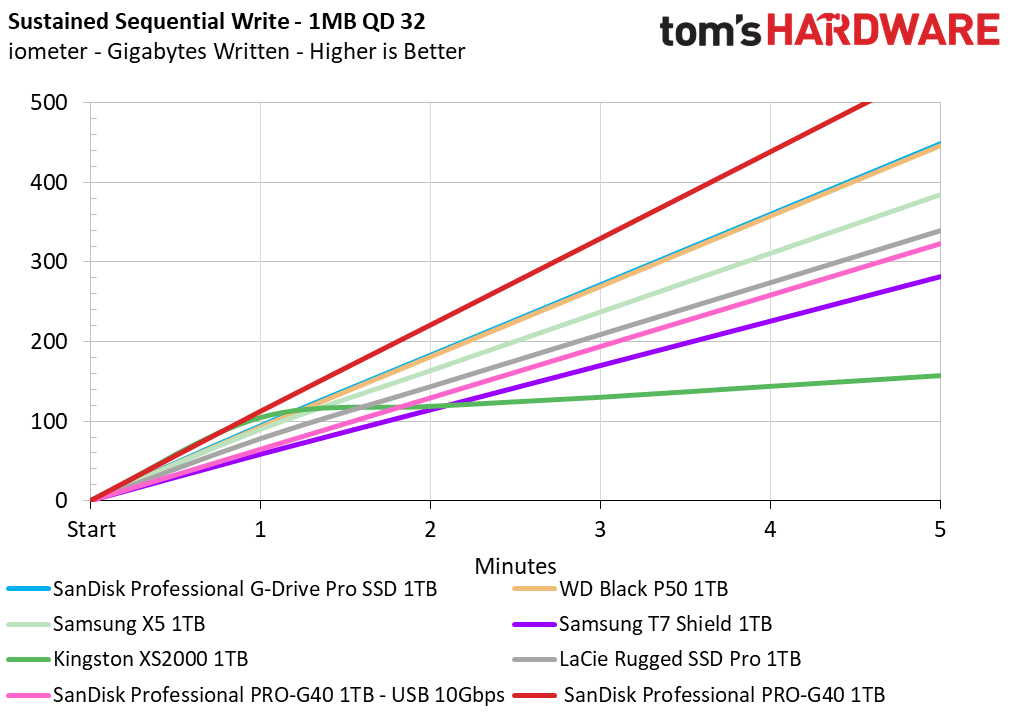
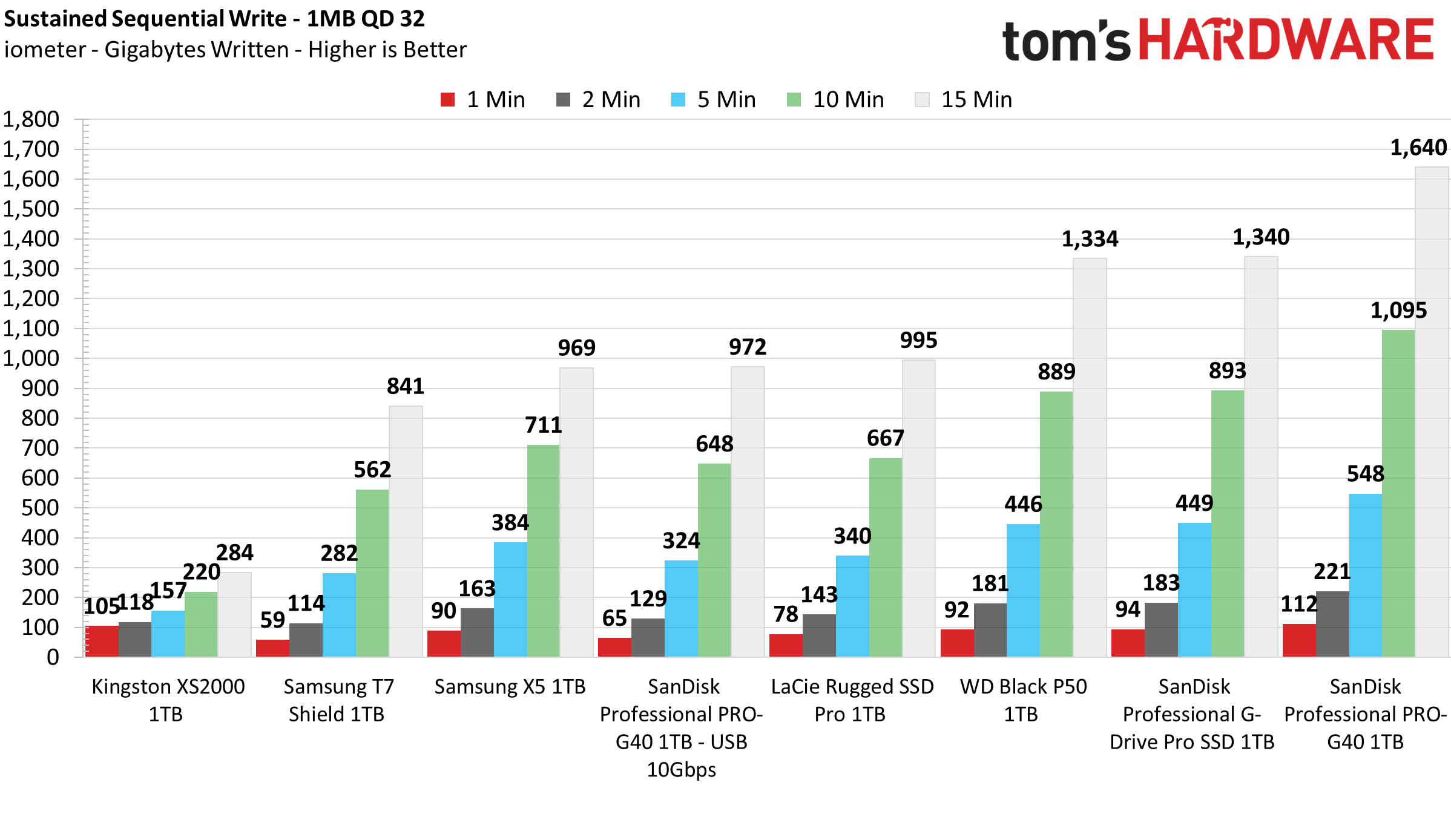
The 1TB SanDisk Pro-G40 does not disappoint during the sustained write benchmarks. It has a small pSLC cache, as also found on the Red SN700 and Black SN750, followed by consistently high TLC performance. The pSLC cache on this drive is static, which can improve endurance and performance consistency. For example, by caching smaller random writes and demonstrating stronger full-drive performance, respectively. This cache can recover quickly to absorb random writes, if necessary.
This also means this drive can out-write anything on the market when in Thunderbolt mode. Even in USB mode it beats the T7 Shield, a drive specifically designed for sustained performance. The Pro-G40 would be excellent for professionals who do a lot of file transfers and need guaranteed performance, particularly in less salubrious environments.
The drive idled at 45C and only hit 60C after a full drive of writes. While the design may be insulative when idle, good thermal contact with a metal case helps the drive stay far away from any throttling state. The case itself remained below 50C and safe to touch.
Test Bench and Testing Notes
| CPU | Intel Core i9-12900K |
| Motherboard | ASUS ROG Maximus Z690 Formula |
| Memory | 2x16GB Corsair Dominator DDR5 5600 CL36 |
| Graphics | Intel Iris Xe UHD Graphics 770 |
| CPU Cooling | Arctic Liquid Freezer II - 420 |
| Case | Streacom BC1 Open Benchtable |
| Power Supply | Corsair SF750 Platinum |
| OS Storage | Sabrent Rocket 4 Plus 2TB |
| Operating System | Windows 11 Pro |
We use an Alder Lake platform with most background applications such as indexing, windows updates, and anti-virus disabled in the OS to reduce run-to-run variability. Each SSD is prefilled to 50% capacity and tested as a secondary device. Unless noted, we use active cooling for all SSDs. Portable SSDs are tested with write caching explicitly enabled for the device within Windows.
Conclusion
The SanDisk Pro-G40 is a truly exceptional portable SSD that checks all the right boxes. Its performance is excellent in almost every test and its ability to sustain high write speeds puts it a cut above drives like the Samsung T7 Shield. It is also rugged without looking ridiculous or taking up a lot of space.
The metal core and reinforced port help make it dust- and water-resistant, but the tight thermal interface also helps the drive dissipate heat under sustained loads. The ability to operate in both Thunderbolt and USB modes also makes it more flexible or faster than drives that only use one or the other.
There is some room for improvement, though. It’s possible to get 20 Gbps out of USB, as with the WD Black P50, although this implementation is usually disregarded in order to jump up to Thunderbolt 3 or newer technology. SanDisk could have also offered a longer cable or a separate Type-C to Type-A cable to improve compatibility, but a small, single cable enhances portability. The Pro-G40 could also have instituted newer hardware for the internal drive, but this would not have appreciably improved its performance. With all these design considerations in mind, the only real drawback to this SSD is its price.
MORE: Best SSDs
MORE: Best External SSDs and Hard Drives
MORE: How We Test HDDs And SSDs
MORE: All SSD Content

Shane Downing is a Freelance Reviewer for Tom’s Hardware US, covering consumer storage hardware.
-
kyzarvs The advert from amazon in the article shows the UK price as £650 ($784 roughly today).Reply
Hard pass. -
fmyhr The names are becoming self-parodying: "Sandisk Professional Pro PRO..."Reply
At this point even an inscrutable alphanumeric jumble a la Mercedes (or AMD / Intel) might be preferable. -
Freedomfish I own two Sandisk Extreme Pro Portable 2 TByte (SDSSDE81-2T00) and I had no problem till today, but it seem that the SSD produced in the end of 2022 have some problems...Reply
here a translation of a german site: https://www.heise.de/news/Externe-Sandisk-SSDs-fallen-am-laufenden-Band-aus-9247983.html
it concerns the Sandisk's Pro-G40 too, have you some information about it?
Many Sandisk external SSDs produced since the end of 2022 are not running reliably. Since the beginning of the year, more and more reports have been increasing that operating systems can no longer access the disks. The stored data is practically no longer accessible.
The hardware does not seem to be broken per se. Instead, there are problems with the file system, regardless of the format and the operating system. For example, the SSDs say goodbye under Windows with FAT formatting, but also under macOS with HFS+. There are numerous reports on Reddit and .
The Arstechnica, The Verge and Petapixel websites also . In all cases, Sandisk ignores press inquiries and public contributions. Also a request by heise online on the 10. August has remained unanswered.
Insufficient firmware updates
On a support page, the Sandisk native Western Digital (WD) only that several external SSDs need a firmware update because they can "disconnect it unexpectedly from the computer." The company does not write anything about the possible data loss. On the page WD also lists its own SSD:
Sandisk Extreme Portable 4 TByte (SDSSDE61-4T00)
Sandisk Extreme Pro Portable 4 TByte (SDSSDE81-4T00)
Sandisk Extreme Pro Portable 2 TByte (SDSSDE81-2T00)
Sandisk Extreme Pro Portable 1 TByte (SDSSDE81-1T00)
Western Digital My Passport 4 TByte (WDBAGF0040BGY)
On the page you can use the search field to see if your own serial number is affected. The information provided by a distributor and user reports indicate that the problem occurs with models that have been produced since November 2022. According to reports, Sandisk's Pro-G40 also seems to be affected.
Meanwhile, the firmware update does not seem to create reliable remedy. The current versions have been available since May, but since then the problem reports are still frequenting – including people who have updated the firmware update.